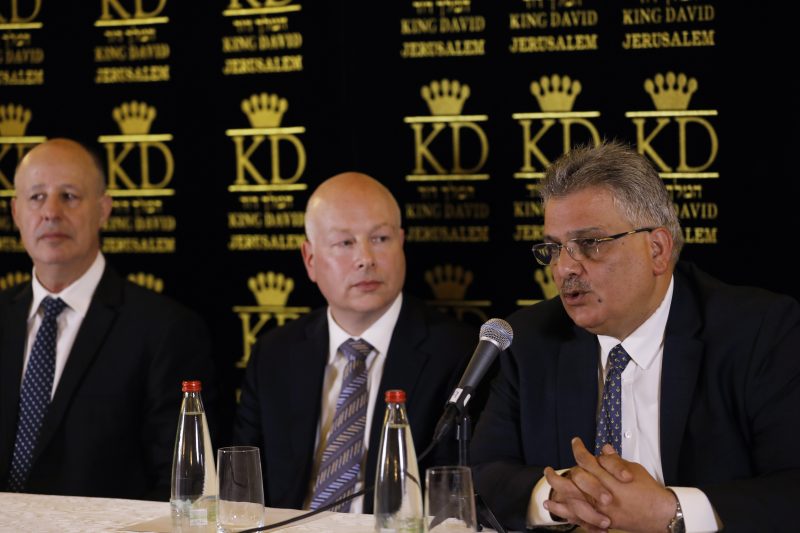Dialogue at standstill, White House speaks to Palestinians by Twitter
US envoy Jason Greenblatt, in the center, speaks in July 2017 in Jerusalem surrounded by Mazen Ghoneim, head of the Palestinian Water Authority, and Israeli Regional Cooperation Minister Tzachi Hanegbi (RONEN ZVULUN)
Washington (AFP) – The United States and the Palestinian Authority are not officially on talking terms, but President Donald Trump’s administration has found a way to communicate nonetheless — Twitter.
Jason Greenblatt, the Twitter-loving US leader’s special representative for international negotiations, has taken to social media over several days in an indirect, if also plainly visible, dialogue with the Palestinian leadership.
Greenblatt and Jared Kushner, Trump’s son-in-law and adviser, have been handed the herculean task of coming up with a plan for peace between Israel and the Palestinians after decades of failed initiatives.
The pair has been discreet, managing against the odds to avoid leaks of upcoming proposals. But their task is complicated as Palestinian president Mahmud Abbas cut off talks with the administration in 2017 after Trump took the landmark decision of recognizing Jerusalem as the capital of Israel.
In his latest tweets on Wednesday, Greenblatt responded to Abbas spokesman Nabil Abu Rudeineh who warned that no peace was possible without the Palestinian people’s assent.
“Well, Mr. Nabil, we agree on something — there is no peace without an agreement. We are working hard on that. You’re doing nothing,” Greenblatt tweeted.
“You can’t claim to want peace and also try to sabotage the potential for an agreement. It can’t go both ways,” he wrote.
Greenblatt in recent days has also gone on Twitter to reply to Palestinian Liberation Organization secretary general Saeb Erekat and fellow senior figure Hanan Ashrawi, often addressing them by their first names on issues ranging from Israeli settlements to US assistance to the status of Jerusalem, the holy city for the three major monotheistic faiths which Palestinians also want as their capital.
“Who says the U.S. and the P.A. aren’t talking? The only difference now is that we are speaking about these matters in public via twitter so the public can understand everyone’s positions. Transparency is better for all,” he tweeted.
The strategy is similar to that of Trump, who has embraced Twitter as a way to speak without the filter of critical media or cautious aides.
When Ashrawi criticized Greenblatt for seeking the “gratification of a tweet” over “serious engagement,” the Trump aide said he was happy to speak.
“I’m happy to meet anytime — you, Saeb and all your colleagues are ALWAYS welcome to visit me at the @WhiteHouse to speak in person,” he tweeted.
Disclaimer: This story is published from a syndicated feed. Siliconeer does not assume any liability for the above story. Validity of the above story is for 7 Days from original date of publishing. Content copyright AFP.


